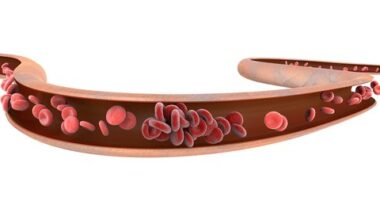Specific autoantibodies can raise cardiovascular disease risk with SLE
30% to 40% of lupus patients reported to have antiphospholipid antibodies

Certain self-reactive antibodies, called antiphospholipid antibodies (aPLs), significantly increase the risk of a heart attack, stroke, or other cardiovascular event in people with systemic lupus erythematosus (SLE), a study shows.
Among aPLS, “we identified that [anticardiolipin antibodies] and lupus anticoagulant positivity are independently associated with [cardiovascular disease], after adjusting for traditional cardiovascular disease risk factors,” Yufang Ding, a medical student at Chinese Academy of Medical Sciences & Peking Union Medical College, in Beijing, and the study’s first author, said in a press release.
Researchers also found that treatments to prevent blood clotting, like anticoagulants, could significantly lower such cardiovascular risks in SLE patients with aPLs.
These findings suggest that people with lupus should be tested for aPLs, and that those positive should be carefully monitored for cardiovascular health and could be given certain medications to help mitigate their risk, the researchers noted.
Heart disease, cardiovascular conditions known to affect lupus patients
Study findings were in the poster “The Impact of Antiphospholipid Antibodies on Future Atherosclerotic Cardiovascular Disease Risk in Systemic Lupus Erythematosus,” presented at the American College of Rheumatology’s ACR Convergence 2023. The annual meeting was held Nov. 10-15 in San Diego.
Antiphospholipid antibodies target phospholipids, fat molecules that are a major component of cell membranes; certain phospholipid-binding blood proteins; and complexes associated with the binding of proteins and phospholipids. The lupus anticoagulant and the anticardiolipin antibody, which are usually found together, are the two most commonly discussed aPLs.
These self-reactive antibodies are known to be associated with an autoimmune condition called antiphospholipid syndrome, where they cause blood clots that can lead to cardiovascular events.
People with SLE, an autoimmune disease, are at a higher risk of cardiovascular diseases. Around 30-40% of SLE patients are reported to have aPLs, but little is known about how these antibodies impact their cardiovascular disease risk.
Ding and her academy mentors, Mengtao Li and Jiuliang Zhao, conducted a multicenter study involving more than 1,500 people diagnosed with lupus between 2006 and 2011. Patients were part of the largest lupus registry in China, the Chinese SLE Treatment and Research Group.
All participants were East Asian and more than 90% were women. At diagnosis and follow-up, researchers screened for seven aPL types: three versions of anticardiolipin antibodies (IgG, IgM, and IgA), three forms of anti-beta-2-glycoprotein antibodies (IgG, IgM, and IgA), and lupus anticoagulant.
“Few studies have demonstrated the role of different aPL [types] in [cardiovascular disease] development,” Ding said.
Lupus anticoagulant was most common antiphospholipid antibody seen
Results showed that about one-third of the group (33.4%) had aPLs. Lupus anticoagulant was the most common (20.6%), followed by anticardiolipin IgG (15.8%), and anti-beta-2-glycoprotein IgG (12.7%).
Cardiovascular events were defined as a heart attack, stroke, artery revascularization — a procedure that can restore blood flow in blocked arteries — or death due to cardiovascular disease.
A total of 116 SLE patients experienced a cardiovascular event during 4.5 years of follow-up, and 92 of them (79.3%) had tested positive for aPLs.
Statistical analyses indicated that the presence of both an aPL and traditional risk factors significantly associated with future cardiovascular events. According to the poster’s abstract, patients testing positive for aPL were nearly eight times more likely to experience such an event.
This positive association was expected, according to Ding, considering previous research showing that aPLs can trigger inflammation and the formation of blood clots in arteries.
Further analyses adjusting for several factors indicated that anticardiolipin IgG, anticardiolipin IgM, and lupus anticoagulant were independently associated with future cardiovascular events in SLE patients. This association also was seen with traditional risk factors, like smoking, high blood pressure, and a patient’s sex and age.
According to the abstract, lupus anticoagulant significantly linked with a five times higher chance of a cardiovascular event, while anticardiolipin IgM and anticardiolipin IgG raised a patient’s risk of such events almost two times.
Blood thinners may lower cardiovascular disease risk in SLE patients
Medications to prevent blood clotting — anticoagulants like heparin or antiplatelet treatments such as aspirin — were found to lower the cardiovascular disease risk among people with SLE. Platelets are the small blood cell fragments that clump to form blood clots.
As such, these types of treatment have “a protective effect on future [cardiovascular events],” the researchers wrote in the abstract.
According to Ding, results suggest that people with SLE should be tested for the presence of aPL, and those who are positive should undergo close cardiovascular surveillance during follow-up.
“The use of low-dose aspirin for primary thrombosis prevention should be carefully considered in SLE patients with positive anticardiolipin antibodies or lupus anticoagulant,” Ding said. Thrombosis refers to blood clots that block blood vessels.
“We are also looking forward to discussing the prevention role of the Mediterranean diet and exercise through an intervention study in the future,” Ding added.







